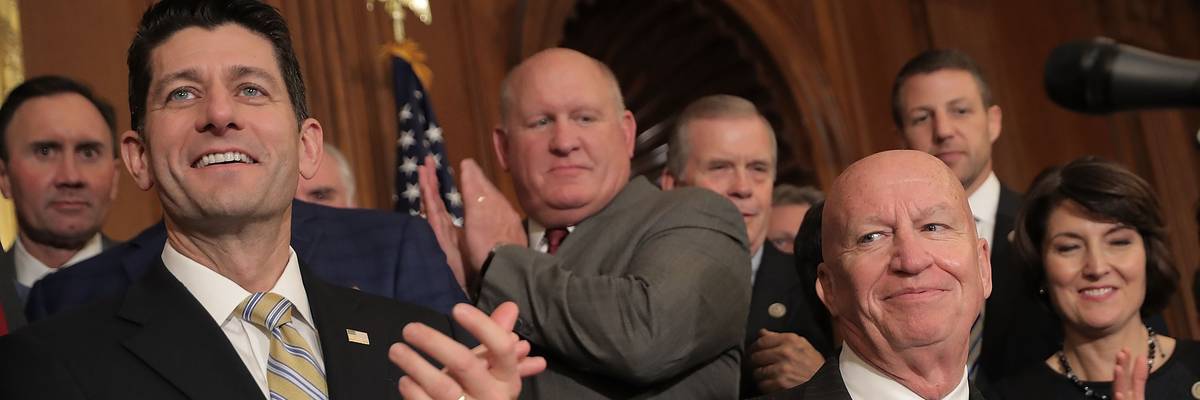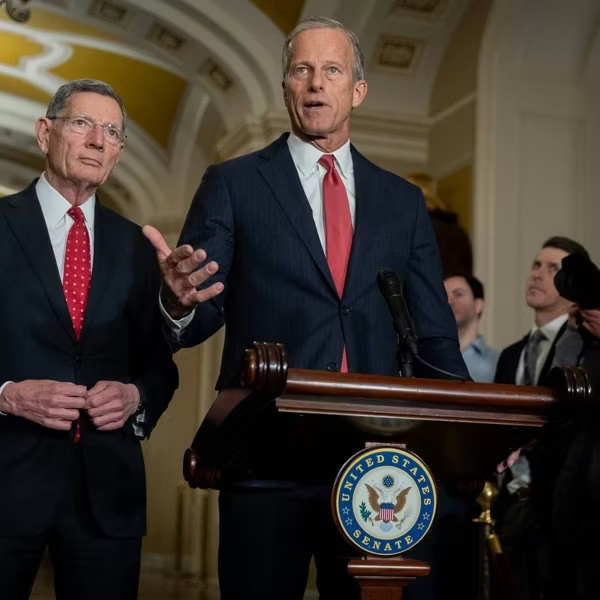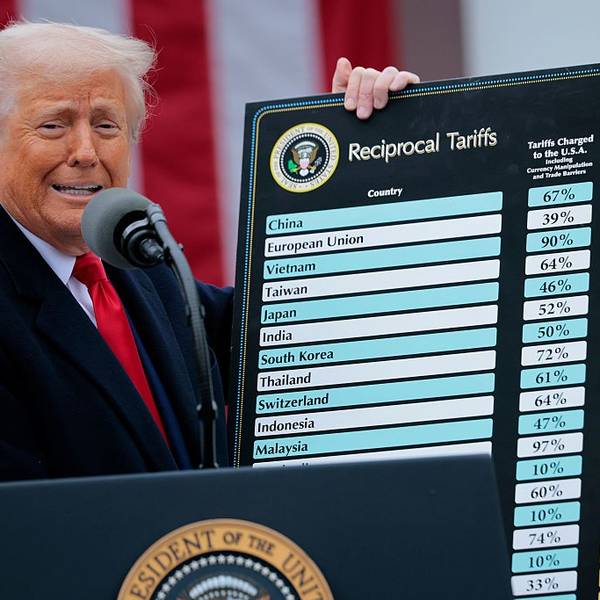
Then-Speaker of the House Paul Ryan (R-Wis.) (L) and House Ways and Means Committee Chairman Kevin Brady (R-Texas) celebrate with fellow House Republicans following the passage of the Tax Cuts and Jobs Act in the Rayburn Room at the U.S. Capitol November 16, 2017 in Washington, D.C.
Let the 2017 Tax Cuts Expire
It is high time for elected leaders to admit publicly that tax increases can sometimes be necessary to allow the government to continue or even expand vital programs.
The tax cuts enacted during the first Trump administration were scheduled to sunset at the end of 2025, returning us to the higher pre-2017 tax levels.
President Donald Trump now wants Congress to renew these tax cuts. But despite deep proposed reductions in many vital programs, extending the 2017 tax rates would guarantee a huge 10-year increase in the national debt.
With only a one vote majority, House Republicans have passed a bill doing exactly this. One must hope that the Senate will not go along with this irresponsible bill.
Which would Americans prefer? To pay somewhat higher taxes but live in a thriving economy, or pay lower taxes but live in a depressed economy?
In today's circumstances, letting the reduced taxes die a natural death would be the best possible action. Although pre-2017 tax levels were far from perfect, restoring them would substantially reduce annual deficits.
This wouldn't require Congress to do anything, which is what Congress does best.
In 2017 we were told that the tax cuts would stimulate so much additional economic activity that the reduced tax rates applied to the stronger economy would "pay" for the cuts. Instead, they drove up the national debt.
The draconian program cuts that are supposed to help pay for extending the 2017 tax rates will injure many people who voted for the new administration.
What are Republican legislators more interested in: reducing budget shortfalls, or reducing the taxes of their wealthy campaign donors?
If balancing the budget were their priority, they would be willing to consider tax increases in order to avoid slashing services for America's less fortunate people—Medicaid, food stamps, housing support, taking care of veterans. And they certainly wouldn't reduce the Internal Revenue Service enforcement budget, which brings in several tax dollars for each dollar spent.
Many Republicans have taken the "Norquist Pledge" never to vote for tax increases, a pledge which is so unwise that it amounts to political malpractice. There can be situations where reducing taxes is desirable, but no responsible leader who has taken Norquist's pledge could ever vote to reduce taxes.
Voting to reduce taxes would require them to make two false assumptions. First, that they can identify exactly how much the reductions should be. And second, that new circumstances will never arise where the reductions need to be reversed.
Letting the 2017 tax reductions expire will be the only way that Republican politicians who have unwisely taken the "pledge" can act responsibly without violating the pledge, since they would not need to vote for the increased taxes that the expiration of the reductions would automatically produce.
It is high time for elected leaders to admit publicly that tax increases can sometimes be necessary to allow the government to continue or even expand vital programs.
Whacking programs like Medicaid is an especially bad idea at a time when displacement of workers by artificial intelligence (AI) means that fewer and fewer jobs will be secure. These former workers will lose their job-related medical insurance, putting their health and that of their families in jeopardy. Many ill people will die prematurely, if they haven't starved first thanks to fewer food stamps.
Everybody else would also be damaged if, as is likely, this results in a major recession.
Medical care is now about one sixth of our economy. Doctors and hospitals employ large numbers of people and are now substantial parts of many local economies. The closure of hospitals caused by reductions in Medicaid will gravely harm these localities. Abruptly injuring one sixth of our economy is not going to be a great idea!
Which would Americans prefer? To pay somewhat higher taxes but live in a thriving economy, or pay lower taxes but live in a depressed economy?
People understandably don't like taxes. Equally understandably, politicians like to tell voters what they want to hear. But they also have a duty to tell the public the truth and to educate voters about where their bread is truly buttered.
One way or another, we all need to be reminded of the old but true saying: There ain't no such thing as a free lunch. TANSTAAFL!
An Urgent Message From Our Co-Founder
Dear Common Dreams reader, The U.S. is on a fast track to authoritarianism like nothing I've ever seen. Meanwhile, corporate news outlets are utterly capitulating to Trump, twisting their coverage to avoid drawing his ire while lining up to stuff cash in his pockets. That's why I believe that Common Dreams is doing the best and most consequential reporting that we've ever done. Our small but mighty team is a progressive reporting powerhouse, covering the news every day that the corporate media never will. Our mission has always been simple: To inform. To inspire. And to ignite change for the common good. Now here's the key piece that I want all our readers to understand: None of this would be possible without your financial support. That's not just some fundraising cliche. It's the absolute and literal truth. We don't accept corporate advertising and never will. We don't have a paywall because we don't think people should be blocked from critical news based on their ability to pay. Everything we do is funded by the donations of readers like you. Will you donate now to help power the nonprofit, independent reporting of Common Dreams? Thank you for being a vital member of our community. Together, we can keep independent journalism alive when it’s needed most. - Craig Brown, Co-founder |
The tax cuts enacted during the first Trump administration were scheduled to sunset at the end of 2025, returning us to the higher pre-2017 tax levels.
President Donald Trump now wants Congress to renew these tax cuts. But despite deep proposed reductions in many vital programs, extending the 2017 tax rates would guarantee a huge 10-year increase in the national debt.
With only a one vote majority, House Republicans have passed a bill doing exactly this. One must hope that the Senate will not go along with this irresponsible bill.
Which would Americans prefer? To pay somewhat higher taxes but live in a thriving economy, or pay lower taxes but live in a depressed economy?
In today's circumstances, letting the reduced taxes die a natural death would be the best possible action. Although pre-2017 tax levels were far from perfect, restoring them would substantially reduce annual deficits.
This wouldn't require Congress to do anything, which is what Congress does best.
In 2017 we were told that the tax cuts would stimulate so much additional economic activity that the reduced tax rates applied to the stronger economy would "pay" for the cuts. Instead, they drove up the national debt.
The draconian program cuts that are supposed to help pay for extending the 2017 tax rates will injure many people who voted for the new administration.
What are Republican legislators more interested in: reducing budget shortfalls, or reducing the taxes of their wealthy campaign donors?
If balancing the budget were their priority, they would be willing to consider tax increases in order to avoid slashing services for America's less fortunate people—Medicaid, food stamps, housing support, taking care of veterans. And they certainly wouldn't reduce the Internal Revenue Service enforcement budget, which brings in several tax dollars for each dollar spent.
Many Republicans have taken the "Norquist Pledge" never to vote for tax increases, a pledge which is so unwise that it amounts to political malpractice. There can be situations where reducing taxes is desirable, but no responsible leader who has taken Norquist's pledge could ever vote to reduce taxes.
Voting to reduce taxes would require them to make two false assumptions. First, that they can identify exactly how much the reductions should be. And second, that new circumstances will never arise where the reductions need to be reversed.
Letting the 2017 tax reductions expire will be the only way that Republican politicians who have unwisely taken the "pledge" can act responsibly without violating the pledge, since they would not need to vote for the increased taxes that the expiration of the reductions would automatically produce.
It is high time for elected leaders to admit publicly that tax increases can sometimes be necessary to allow the government to continue or even expand vital programs.
Whacking programs like Medicaid is an especially bad idea at a time when displacement of workers by artificial intelligence (AI) means that fewer and fewer jobs will be secure. These former workers will lose their job-related medical insurance, putting their health and that of their families in jeopardy. Many ill people will die prematurely, if they haven't starved first thanks to fewer food stamps.
Everybody else would also be damaged if, as is likely, this results in a major recession.
Medical care is now about one sixth of our economy. Doctors and hospitals employ large numbers of people and are now substantial parts of many local economies. The closure of hospitals caused by reductions in Medicaid will gravely harm these localities. Abruptly injuring one sixth of our economy is not going to be a great idea!
Which would Americans prefer? To pay somewhat higher taxes but live in a thriving economy, or pay lower taxes but live in a depressed economy?
People understandably don't like taxes. Equally understandably, politicians like to tell voters what they want to hear. But they also have a duty to tell the public the truth and to educate voters about where their bread is truly buttered.
One way or another, we all need to be reminded of the old but true saying: There ain't no such thing as a free lunch. TANSTAAFL!
- The House GOP Budget Is a Lie and Will Hurt People—And They Know It ›
- 'Reverse of Robin Hood' 2.0: Trump Vows to Extend Billionaire Tax Cuts If Reelected ›
- Analysis Shows More Than Half of Total Trump-GOP Tax Plan Benefits Go to Richest 5% ›
- Next Congress Must Overhaul Tax Code to Make Corporations Pay: Coalition ›
- 'Really Inexcusable': Progressives Lament Democrats' Failure to Reverse Trump Tax Cuts ›
- Trump GOP's Tax Plans Mean Pain for Families, Windfalls for the Wealthy ›
The tax cuts enacted during the first Trump administration were scheduled to sunset at the end of 2025, returning us to the higher pre-2017 tax levels.
President Donald Trump now wants Congress to renew these tax cuts. But despite deep proposed reductions in many vital programs, extending the 2017 tax rates would guarantee a huge 10-year increase in the national debt.
With only a one vote majority, House Republicans have passed a bill doing exactly this. One must hope that the Senate will not go along with this irresponsible bill.
Which would Americans prefer? To pay somewhat higher taxes but live in a thriving economy, or pay lower taxes but live in a depressed economy?
In today's circumstances, letting the reduced taxes die a natural death would be the best possible action. Although pre-2017 tax levels were far from perfect, restoring them would substantially reduce annual deficits.
This wouldn't require Congress to do anything, which is what Congress does best.
In 2017 we were told that the tax cuts would stimulate so much additional economic activity that the reduced tax rates applied to the stronger economy would "pay" for the cuts. Instead, they drove up the national debt.
The draconian program cuts that are supposed to help pay for extending the 2017 tax rates will injure many people who voted for the new administration.
What are Republican legislators more interested in: reducing budget shortfalls, or reducing the taxes of their wealthy campaign donors?
If balancing the budget were their priority, they would be willing to consider tax increases in order to avoid slashing services for America's less fortunate people—Medicaid, food stamps, housing support, taking care of veterans. And they certainly wouldn't reduce the Internal Revenue Service enforcement budget, which brings in several tax dollars for each dollar spent.
Many Republicans have taken the "Norquist Pledge" never to vote for tax increases, a pledge which is so unwise that it amounts to political malpractice. There can be situations where reducing taxes is desirable, but no responsible leader who has taken Norquist's pledge could ever vote to reduce taxes.
Voting to reduce taxes would require them to make two false assumptions. First, that they can identify exactly how much the reductions should be. And second, that new circumstances will never arise where the reductions need to be reversed.
Letting the 2017 tax reductions expire will be the only way that Republican politicians who have unwisely taken the "pledge" can act responsibly without violating the pledge, since they would not need to vote for the increased taxes that the expiration of the reductions would automatically produce.
It is high time for elected leaders to admit publicly that tax increases can sometimes be necessary to allow the government to continue or even expand vital programs.
Whacking programs like Medicaid is an especially bad idea at a time when displacement of workers by artificial intelligence (AI) means that fewer and fewer jobs will be secure. These former workers will lose their job-related medical insurance, putting their health and that of their families in jeopardy. Many ill people will die prematurely, if they haven't starved first thanks to fewer food stamps.
Everybody else would also be damaged if, as is likely, this results in a major recession.
Medical care is now about one sixth of our economy. Doctors and hospitals employ large numbers of people and are now substantial parts of many local economies. The closure of hospitals caused by reductions in Medicaid will gravely harm these localities. Abruptly injuring one sixth of our economy is not going to be a great idea!
Which would Americans prefer? To pay somewhat higher taxes but live in a thriving economy, or pay lower taxes but live in a depressed economy?
People understandably don't like taxes. Equally understandably, politicians like to tell voters what they want to hear. But they also have a duty to tell the public the truth and to educate voters about where their bread is truly buttered.
One way or another, we all need to be reminded of the old but true saying: There ain't no such thing as a free lunch. TANSTAAFL!
- The House GOP Budget Is a Lie and Will Hurt People—And They Know It ›
- 'Reverse of Robin Hood' 2.0: Trump Vows to Extend Billionaire Tax Cuts If Reelected ›
- Analysis Shows More Than Half of Total Trump-GOP Tax Plan Benefits Go to Richest 5% ›
- Next Congress Must Overhaul Tax Code to Make Corporations Pay: Coalition ›
- 'Really Inexcusable': Progressives Lament Democrats' Failure to Reverse Trump Tax Cuts ›
- Trump GOP's Tax Plans Mean Pain for Families, Windfalls for the Wealthy ›

